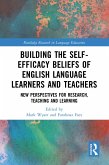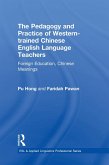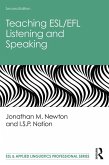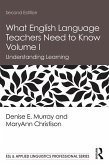Building the Self-Efficacy Beliefs of English Language Learners and Teachers (eBook, ePUB)
New Perspectives for Research, Teaching and Learning
Redaktion: Wyatt, Mark; Faez, Farahnaz
42,95 €
42,95 €
inkl. MwSt.
Sofort per Download lieferbar

21 °P sammeln
42,95 €
Als Download kaufen

42,95 €
inkl. MwSt.
Sofort per Download lieferbar

21 °P sammeln
Jetzt verschenken
Alle Infos zum eBook verschenken
42,95 €
inkl. MwSt.
Sofort per Download lieferbar
Alle Infos zum eBook verschenken

21 °P sammeln
Building the Self-Efficacy Beliefs of English Language Learners and Teachers (eBook, ePUB)
New Perspectives for Research, Teaching and Learning
Redaktion: Wyatt, Mark; Faez, Farahnaz
- Format: ePub
- Merkliste
- Auf die Merkliste
- Bewerten Bewerten
- Teilen
- Produkt teilen
- Produkterinnerung
- Produkterinnerung

Bitte loggen Sie sich zunächst in Ihr Kundenkonto ein oder registrieren Sie sich bei
bücher.de, um das eBook-Abo tolino select nutzen zu können.
Hier können Sie sich einloggen
Hier können Sie sich einloggen
Sie sind bereits eingeloggt. Klicken Sie auf 2. tolino select Abo, um fortzufahren.

Bitte loggen Sie sich zunächst in Ihr Kundenkonto ein oder registrieren Sie sich bei bücher.de, um das eBook-Abo tolino select nutzen zu können.
Building the Self-Efficacy Beliefs of English Language Learners and Teachers explores, juxtaposes and bridges two fields of research that have developed separately: the self-efficacy beliefs of English language learners and the self-efficacy beliefs of English language teachers.
- Geräte: eReader
- mit Kopierschutz
- eBook Hilfe
Andere Kunden interessierten sich auch für
![Building the Self-Efficacy Beliefs of English Language Learners and Teachers (eBook, PDF) Building the Self-Efficacy Beliefs of English Language Learners and Teachers (eBook, PDF)]() Building the Self-Efficacy Beliefs of English Language Learners and Teachers (eBook, PDF)42,95 €
Building the Self-Efficacy Beliefs of English Language Learners and Teachers (eBook, PDF)42,95 €![The Pedagogy and Practice of Western-trained Chinese English Language Teachers (eBook, ePUB) The Pedagogy and Practice of Western-trained Chinese English Language Teachers (eBook, ePUB)]() Pu HongThe Pedagogy and Practice of Western-trained Chinese English Language Teachers (eBook, ePUB)51,95 €
Pu HongThe Pedagogy and Practice of Western-trained Chinese English Language Teachers (eBook, ePUB)51,95 €![Race, Culture, and Identities in Second Language Education (eBook, ePUB) Race, Culture, and Identities in Second Language Education (eBook, ePUB)]() Race, Culture, and Identities in Second Language Education (eBook, ePUB)54,95 €
Race, Culture, and Identities in Second Language Education (eBook, ePUB)54,95 €![Teaching ESL/EFL Listening and Speaking (eBook, ePUB) Teaching ESL/EFL Listening and Speaking (eBook, ePUB)]() Jonathan M. NewtonTeaching ESL/EFL Listening and Speaking (eBook, ePUB)42,95 €
Jonathan M. NewtonTeaching ESL/EFL Listening and Speaking (eBook, ePUB)42,95 €![What English Language Teachers Need to Know Volume I (eBook, ePUB) What English Language Teachers Need to Know Volume I (eBook, ePUB)]() Denise E. MurrayWhat English Language Teachers Need to Know Volume I (eBook, ePUB)45,95 €
Denise E. MurrayWhat English Language Teachers Need to Know Volume I (eBook, ePUB)45,95 €![What English Language Teachers Need to Know Volume III (eBook, ePUB) What English Language Teachers Need to Know Volume III (eBook, ePUB)]() Maryann ChristisonWhat English Language Teachers Need to Know Volume III (eBook, ePUB)40,95 €
Maryann ChristisonWhat English Language Teachers Need to Know Volume III (eBook, ePUB)40,95 €![Building a Validity Argument for the Test of English as a Foreign Language(TM) (eBook, ePUB) Building a Validity Argument for the Test of English as a Foreign Language(TM) (eBook, ePUB)]() Building a Validity Argument for the Test of English as a Foreign Language(TM) (eBook, ePUB)55,95 €
Building a Validity Argument for the Test of English as a Foreign Language(TM) (eBook, ePUB)55,95 €-
-
-
Building the Self-Efficacy Beliefs of English Language Learners and Teachers explores, juxtaposes and bridges two fields of research that have developed separately: the self-efficacy beliefs of English language learners and the self-efficacy beliefs of English language teachers.
Dieser Download kann aus rechtlichen Gründen nur mit Rechnungsadresse in A, B, BG, CY, CZ, D, DK, EW, E, FIN, F, GR, HR, H, IRL, I, LT, L, LR, M, NL, PL, P, R, S, SLO, SK ausgeliefert werden.
Produktdetails
- Produktdetails
- Verlag: Taylor & Francis eBooks
- Seitenzahl: 256
- Erscheinungstermin: 20. Februar 2024
- Englisch
- ISBN-13: 9781003853299
- Artikelnr.: 69744878
- Verlag: Taylor & Francis eBooks
- Seitenzahl: 256
- Erscheinungstermin: 20. Februar 2024
- Englisch
- ISBN-13: 9781003853299
- Artikelnr.: 69744878
- Herstellerkennzeichnung Die Herstellerinformationen sind derzeit nicht verfügbar.
Mark Wyatt recently retired as Associate Professor of English at Khalifa University, United Arab Emirates. Farahnaz Faez is Professor in the Faculty of Education at The University of Western Ontario, Canada.
1. 1. Building English language learners' and teachers' self-efficacy
beliefs Part 1: Synthesizing the literature to expand understanding of
language teachers' self-efficacy beliefs 2. Language teacher self-efficacy
surveys: What have we learned? Where are we going? 3. Language teachers'
self-efficacy beliefs in the Turkish EFL context Part 2: Exploring factors
impacting the development of English language teachers' self-efficacy
beliefs 4. The formation of pre-service language teachers' self-efficacy
beliefs: A case study 5. Novice EFL teachers' self-efficacy beliefs in the
first year: an insight into the impact of task-, domain-, and
context-specific factors upon perceptions of efficacy 6. Language teachers'
self-efficacy beliefs evident in teacher-supervisor post-observation
conferences in Iran 7. Support for career-long development of LTSE beliefs:
Two Chinese EFL teachers' stories of professional development 8. Growing
teacher research efficacy beliefs through Exploratory Practice: An
autoethnography Part 3: Investigating domain-specific dimensions of English
language learners' and teachers' self-efficacy beliefs 9. "I'm not a
walking dictionary": Unpacking English language teachers' self-efficacy
beliefs about teaching vocabulary 10. An exploratory study on teachers' and
learners' self-efficacy beliefs in foreign language listening in Algeria
11. Changes in the academic writing self-efficacy beliefs of students in
transition from high school to an English medium instruction university
programme in Japan 12. Exploring language self-efficacy beliefs and
technology-based learning strategies in an increasingly digitalized world
Epilogue 13. Researching the self-efficacy beliefs of language learners and
teachers: The roads ahead
beliefs Part 1: Synthesizing the literature to expand understanding of
language teachers' self-efficacy beliefs 2. Language teacher self-efficacy
surveys: What have we learned? Where are we going? 3. Language teachers'
self-efficacy beliefs in the Turkish EFL context Part 2: Exploring factors
impacting the development of English language teachers' self-efficacy
beliefs 4. The formation of pre-service language teachers' self-efficacy
beliefs: A case study 5. Novice EFL teachers' self-efficacy beliefs in the
first year: an insight into the impact of task-, domain-, and
context-specific factors upon perceptions of efficacy 6. Language teachers'
self-efficacy beliefs evident in teacher-supervisor post-observation
conferences in Iran 7. Support for career-long development of LTSE beliefs:
Two Chinese EFL teachers' stories of professional development 8. Growing
teacher research efficacy beliefs through Exploratory Practice: An
autoethnography Part 3: Investigating domain-specific dimensions of English
language learners' and teachers' self-efficacy beliefs 9. "I'm not a
walking dictionary": Unpacking English language teachers' self-efficacy
beliefs about teaching vocabulary 10. An exploratory study on teachers' and
learners' self-efficacy beliefs in foreign language listening in Algeria
11. Changes in the academic writing self-efficacy beliefs of students in
transition from high school to an English medium instruction university
programme in Japan 12. Exploring language self-efficacy beliefs and
technology-based learning strategies in an increasingly digitalized world
Epilogue 13. Researching the self-efficacy beliefs of language learners and
teachers: The roads ahead
1. 1. Building English language learners' and teachers' self-efficacy
beliefs Part 1: Synthesizing the literature to expand understanding of
language teachers' self-efficacy beliefs 2. Language teacher self-efficacy
surveys: What have we learned? Where are we going? 3. Language teachers'
self-efficacy beliefs in the Turkish EFL context Part 2: Exploring factors
impacting the development of English language teachers' self-efficacy
beliefs 4. The formation of pre-service language teachers' self-efficacy
beliefs: A case study 5. Novice EFL teachers' self-efficacy beliefs in the
first year: an insight into the impact of task-, domain-, and
context-specific factors upon perceptions of efficacy 6. Language teachers'
self-efficacy beliefs evident in teacher-supervisor post-observation
conferences in Iran 7. Support for career-long development of LTSE beliefs:
Two Chinese EFL teachers' stories of professional development 8. Growing
teacher research efficacy beliefs through Exploratory Practice: An
autoethnography Part 3: Investigating domain-specific dimensions of English
language learners' and teachers' self-efficacy beliefs 9. "I'm not a
walking dictionary": Unpacking English language teachers' self-efficacy
beliefs about teaching vocabulary 10. An exploratory study on teachers' and
learners' self-efficacy beliefs in foreign language listening in Algeria
11. Changes in the academic writing self-efficacy beliefs of students in
transition from high school to an English medium instruction university
programme in Japan 12. Exploring language self-efficacy beliefs and
technology-based learning strategies in an increasingly digitalized world
Epilogue 13. Researching the self-efficacy beliefs of language learners and
teachers: The roads ahead
beliefs Part 1: Synthesizing the literature to expand understanding of
language teachers' self-efficacy beliefs 2. Language teacher self-efficacy
surveys: What have we learned? Where are we going? 3. Language teachers'
self-efficacy beliefs in the Turkish EFL context Part 2: Exploring factors
impacting the development of English language teachers' self-efficacy
beliefs 4. The formation of pre-service language teachers' self-efficacy
beliefs: A case study 5. Novice EFL teachers' self-efficacy beliefs in the
first year: an insight into the impact of task-, domain-, and
context-specific factors upon perceptions of efficacy 6. Language teachers'
self-efficacy beliefs evident in teacher-supervisor post-observation
conferences in Iran 7. Support for career-long development of LTSE beliefs:
Two Chinese EFL teachers' stories of professional development 8. Growing
teacher research efficacy beliefs through Exploratory Practice: An
autoethnography Part 3: Investigating domain-specific dimensions of English
language learners' and teachers' self-efficacy beliefs 9. "I'm not a
walking dictionary": Unpacking English language teachers' self-efficacy
beliefs about teaching vocabulary 10. An exploratory study on teachers' and
learners' self-efficacy beliefs in foreign language listening in Algeria
11. Changes in the academic writing self-efficacy beliefs of students in
transition from high school to an English medium instruction university
programme in Japan 12. Exploring language self-efficacy beliefs and
technology-based learning strategies in an increasingly digitalized world
Epilogue 13. Researching the self-efficacy beliefs of language learners and
teachers: The roads ahead







